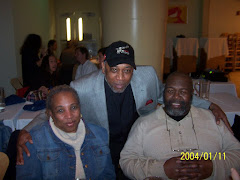Meetings of Pacifica Radio’s National Board rarely provide sufficient time for sustained reflection. With 22 members from across the country vying to be heard, plus the restrictions imposed by Roberts Rules of Order, unrealistic time limits and an irresistible tendency to delve into operational details, discussions can be bewildering and inconclusive.
Nevertheless, during the January 2006 meeting in Washington DC I tried to describe what I was seeing and hoped to do about it as the new executive director. “Shortly after accepting this job,” I noted, “I talked with a dedicated Pacifica supporter who at one time also considered going after this position. From what I knew, this person seemed well suited for the work. So, why didn't you apply? I asked. The reply was revealing: ‘Well, I wanted to work again.’”
It was supposed to be an amusing ice-breaker for my first ED report, but there was a serious point, the difficulty of working in such a highly charged environment.
Getting down to specifics, I ran through the issues that had emerged during my first days on the job – the Board’s decision to launch a national Spanish language show, the future of national programming, the need to reach an agreement with FSRN, as well as CPB standards, direct mail plans, and diversifying revenue by taking advantage of the potential for new satellite and Internet channels. After talking with the HR Director, Yolanda Thomas, I’d negotiated a minor office reorganization that gave her a private room for confidential discussions. We’d also worked out a new hiring process and agreed that the long-overdue adoption of a “code of conduct” would be necessary to address many of the problems that led to conflict and litigation.
Moving on to diversity, a central value within the community, I noted that it wasn’t just needed to secure public funding. It influenced Pacifica’s election process, staffing decisions, and programming to reach underserved communities. And that led back to the mission. Everyone talked about it, of course, but after 57 years and dramatic changes in media, not everyone saw it the same way. My recommendation was to “revisit” the idealistic statements Lew Hill had penned back in the 1940s, find out where people agreed and differed, and hopefully reach consensus on why Pacifica was a vital part of the 21st century media landscape.
That didn’t end up happening. But in the moment, while sketching out hopes and visions in those optimistic opening days, I suspended my skepticism and convinced myself that it might be possible to prevent the exploitation of what looked like a bold experiment in media democracy, to stop it from becoming “an excuse for demagoguery, or a war of attrition in which the loudest voices and those with the most time can simply wear the organization down.” Mission-driven programming, fair employment practices, a culture of cooperation, financial transparency and effective management that treated people with respect – maybe Pacifica could still get there.
Was I being naïve? Probably. As I tried to explain, in the months ahead “the public may read or hear some strange things about what is happening at Pacifica – reports that sound disturbing, even dangerous.” That looked unavoidable. Nevertheless, I asked people to think about it this way: “Those who issue harsh, even cruel judgments will really be telling you more about themselves than the foundation and its work. They will be appealing to people's fears, assumptions, and projections about what THEY might do if they were in our shoes. The truth is: they're captives in a nightmare.”
The idea was to acknowledge the fears, but then say, “Wake up. Most of it just isn't happening.” How to prove it – that was the real question.
On Sunday morning, during an executive session, I had an early opportunity. Discussing the specifics of what transpired during closed door meetings would violate my pledge upon taking the job. However, many of the issues debated there do eventually find their way onto blogs and into the public domain. So, let me put it this way: Board members wanted to know about a recent financial settlement, one that some of those involved preferred not to discuss. Since I knew the details, sharing them with the group felt like the thing to do.
The impact of the revelation was immediate, effectively telegraphing that things might change after all, that management and the board didn’t have to be at odds and real “transparency” was actually possible. It also made me some enemies. By challenging the notion that it was all right to keep board members in the dark, I was suggesting that the organization’s covert power structure might be exposed. And, in refusing to be cowed by those who defined every issue on the basis of race, I was saying that the days when guilt trips and demonization effectively ended a discussion could be coming to an end.
Pacifica’s “bold experiment” in democracy had some obvious flaws. But maybe the soft despotism of self-interest – that degrader of democracy, imagination and free thought Alexis de Tocqueville identified almost two centuries ago – might not be inevitable. Then again, it was difficult to overlook what I’d learned only hours before during a trip to the DC Radio Coop.
That outing had been arranged by Sam Husseini, an intense media watchdog who made contact at the start of the weekend. Sam worked with the Institute for Public Accuracy as communications director and had chaired WPFW’s Local Advisory Board during Pacifica’s hijack days. He was a tough critic of both national management and the DC station’s shortage of public affairs programs. The way he saw it, the network was missing golden opportunities to ask tough questions in the nation’s capital. He was especially upset that the one person with a show who challenged the “Washington Consensus” at White House briefings, Russell Mokhiber, editor of the Corporate Crime Reporter newsletter, had been repeatedly preempted on WPFW and ultimately cancelled.
Located at the Al-Fishawy Café in northwest DC, the Radio Coop has since become a fully-functioning community center. A collective that produces alternative content, it also works with groups like FSRN, the Capitol District’s Independent media center and local radio stations, and provides training and production facilities for local media activists. In late January 2006, however, its home base was still under construction in a cavernous basement below the cafe.
Sam introduced one of the founders, Ryme Katkhouda, a feisty organizer of Syrian descent who had begun producing and training at WPFW in 2003. Though she still produced a show, her relationship with the station had turned sour during a turf battle between volunteers, contract workers, and unionized staff. Some said the real issue was her Arab nationality, and one Black local board member, attorney Thomas Ruffin, charged that it was part of a pattern of discrimination. The station’s Black manager Ron Pinchback, with the acquiescence of the local station board, was driving away talent and perhaps even breaking the law, he claimed.
By the time we arrived, a heated discussion was underway. Three members of the national board, WBAI delegates who were members the Black-led Justice and Unity Coalition, had stopped by on a fact-finding mission. For the next hour Ruffin, Katkhouda and Thomas Gomez, another disaffected local producer, detailed their case. Passed over for promotions and jobs, Katkhouda and Gomez said they had become targets of workplace harassment aimed mainly at non-Black immigrants. The underlying charge was racism – specifically, lack of inclusion -- at the predominantly Black-managed and focused station. Two weeks later, Katkhouda filed a complaint with the DC Office of Human Rights charging that WPFW had subjected her to discrimination “based on her ethnicity, national original, race, and gender.”
This wasn’t the only legal fight on the horizon. A female prison guard in Houston was talking to her lawyer about an on-air remark made during a KPFT show, New York radio journalist Robert Knight was threatening legal action after being dismissed, KPFA program coordinator Vini Beacham had approached the Department of Fair Housing and Employment about comments by local board members he considered slanderous, and a lawsuit had been filed by former KPFA producer Noelle Hanrahan, claiming gender discrimination by Flashpoints host Dennis Bernstein and unlawful termination by the station. Added to all that, the struggle inside WPFW made the obstacles impossible to ignore.
It would take more than altruistic sentiments and a commitment to transparency to bring peace to this place.
Part six of “Managing Pacifica: In the Bubble.”
Next: Strategy and Struggles































No comments:
Post a Comment